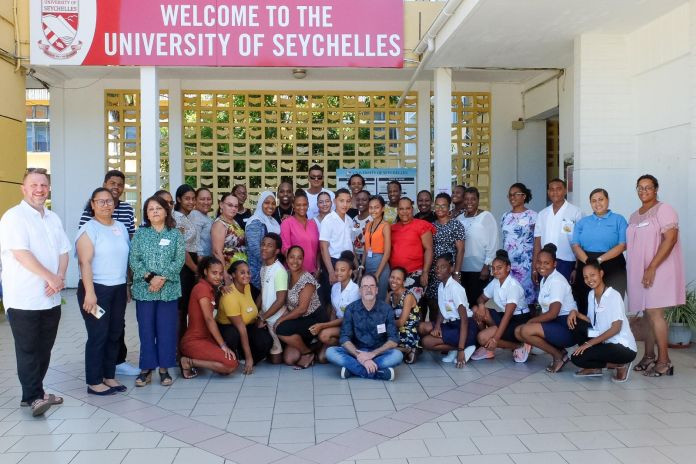LONDON, England – The Commonwealth Higher Education Youth Work Consortium (CHEYWC), supported by the Commonwealth Secretariat, organised a technical workshop for youth workers aimed at bolstering the professionalisation of the youth sector.
The workshop, held in Mahe, Seychelles 15-19 May 2023, bought together experts, academics, youth and government representatives at the University of Seychelles (UniSey). It was designed to support the training of youth workers who help young people with their personal, social and educational development using academic, care and leisure approaches.
Strengthening youth work in the Seychelles
The in-person workshop complements a series of online sessions held earlier in the year to enable the University of the Seychelles to deliver an optimal diploma and degree courses in Youth Work. Facilitated by the Commonwealth Secretariat and Kevin Jones from the UK National Youth Agency, it provided training and resources to develop and strengthen the youth work program at diploma and degree levels.
The training event was held in collaboration with UniSey and other key stakeholders, including the ministry of youth, sports and family, the Seychelles Qualification Authority, and the National Institute of Health and Social Studies.
The workshop sought to establish clear qualification pathways for youth workers, youth work managers and policymakers. It focussed on youth-targeted public services and coincided with the review of degree programs in the Health and Social Care department to ensure courses align with national priorities, youth needs, and regional and international standards.
The three-day workshop opened with welcoming remarks by the Vice Chancellor of the University of the Seychelles, Joelle Perreau, said:
“UniSey remains determined and resilient to transform the nation into an educated, reflective and professional population; to make higher education more accessible to every Seychellois and to lead empirical research in various fields of national interest.
“We do understand, nonetheless, that we cannot achieve this bold ambition on our own. This is why collaboration with local and international partners like the Commonwealth and the Seychelles National Youth Council is paramount.”
During the meeting, participants explored infrastructure for youth and community development work, contextualisation of the Youth Degree Programme, curriculum design and content, subject benchmarking, approaches to teaching and learning, quality assurance, and program development.
Plenary discussions, presentations and interactive sessions provided a dynamic environment for sharing experiences, best practices and innovative ideas. In the first two days, youth workers were able to reflect on their practice, needs, and challenges. On the final day, young people were given the opportunity to share their concerns and articulate how they wanted to be supported by youth workers.
Impact of training
By the end of the workshop, the participants had gained a comprehensive understanding of the processes and structures needed to deliver the courses effectively. They had also agreed on a course programme and content to meet the National Qualifications Framework criteria.
Dr Amina Osman, advisor for education at the Commonwealth Secretariat, summed up the workshop, noted:
“We are delighted with the resounding success of the workshop, as it brought together diverse stakeholders who displayed remarkable commitment and collaboration. The discussions were fruitful, and we witnessed the emergence of innovative ideas and practical solutions.
“While we witness the progress made in recognising and promoting youth work in the Seychelles, it is important to acknowledge that it is still an emerging discipline that needs to be fully integrated and institutionalised in the youth and national development strategy. We are pleased to see the rightful place and recognition of Youth Work in the academic field at the University of Seychelles.”
There is tangible evidence that these courses empower participants. Marcus Mederic, director of youth empowerment and well-being at the Seychelles National Youth Council, shared how a similar course has impacted him.
Mederic said: “Personally, this course has been a catalyst for growth, fuelling my passion to ignite change, foster resilience and influence with a wider frame of reference. To professionals across sectors, I would recommend this transformative journey, to empower, inspire and shape the bright future that lies within our grasp.”
Closing the workshop, the Dean of Faculty, Dr Justin Zelime, encouraged the University to use the newly acquired tools effectively. He also presented Juliana Toussaint and Betty-May Leona with certificates of achievement for the Introduction of Youth Work course from the University of Seychelles.
Overall, the workshop helped to advance youth work education and the overarching effort to empower the next generation of young people, who make up 60 percent of the Commonwealth’s 2.5 billion people.





